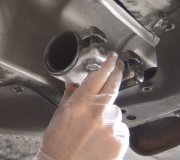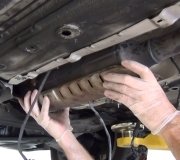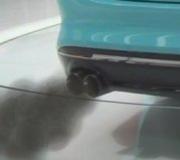You misunderstood my meanin'. When the engine gets flooded with excessive water, it will cause the engine to lock up, but usually without causing serious or permanent damage. The engine will not turn over with the starter because there's no way for that water to get out, ... Until you remove the spark plugs. At that point, with the spark plugs removed, cranking the engine just a few revolutions will push the water out. Once the spark plugs are dried off, you can reinstall them and the engine should start and run.
You've been driving for two days. That means if there was any water that got into the air intake system, it has been gone now for two days. If you're having a running problem, it's more likely water got into an electrical connector. If something sounds different, look for a plastic shield that got moved, a leak in the exhaust system. Or a missing noise shield. Noise shields can be a rubber plug in a hole, a plastic or rubber plate or cover, or a rubber tube placed over a hose or bracket. They are there to reduce the chances of you hearing a noise that is normal for that car. Unless you notice something missing that was there before, missing noise shields are hard to spot unless you have another identical car to compare yours to or you're a dealership mechanic who is familiar with that model and recognizes the part is missing.
Very often a dealership mechanic will know exactly what to look for with a specific noise because they've heard it before when they forgot to put something back correctly during some other service.
Thursday, May 21st, 2015 AT 6:00 PM


